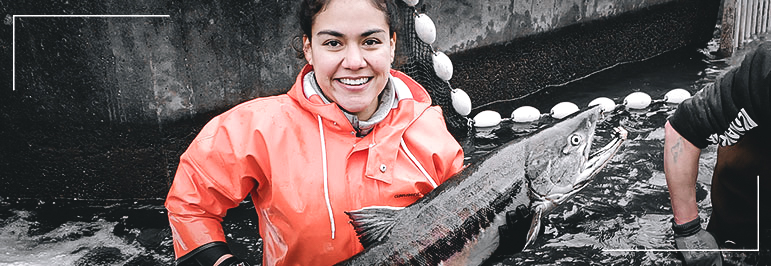Fisheries Science

Fisheries Sciences - AAS
Are you looking to leave your desk behind and start your outdoor career? Do you have a passion for protecting our natural resources? Do you enjoy the thrill of hiking up a stream or casting off at the dock? If so, then the Fisheries Science AAS Degree is the right choice for you.
There are strong economic and cultural ties to fishing, and these activities are at risk as the demands for seafood outweigh what the ecosystems can provide. Fisheries professionals are tasked with monitoring fish populations to ensure continuing harvests, while protecting sustainable stocks year to year. The on-the-ground boots for these essential duties are fisheries technicians, who provide fisheries managers with the data they need to make sound decisions and set fishing targets.
Students in this degree will gain the critical skills needed to be a successful fisheries technician. Through a variety of field and lab operations, students will learn how to design surveys, operate sampling equipment, and prepare data for management goals. Training courses are offered in both in-person and online formats to increase flexibility for traveling to freshwater and marine field sites, where students will conduct habitat and population assessments.
To further enhance the learning experience, students will work with state and tribal fisheries managers, while learning the essentials of aquatic ecology, fish biology, and fisheries conservation. Students will have the unique experience of working within the “co-management” system, as Washington is the only state in the union that recognizes tribal fishing rights for equal partnership.
Ready to start your career in fisheries science? Your training experience to become a qualified technician awaits in the blue-green waters of the Salish Sea.
Upon completion of this AAS degree, students will also receive the Fundamentals of Aquatic Science and Fisheries Field and Lab Techniques Certificates.
Employment Information
Data are provided on a program (not credential) level
76% BTC graduate placement rate1
$49,303 starting annual wage2
$56,597 average annual wage2
$66,348 potential annual wage2
Entry Information
When Can I Start?
This program typically starts in Fall quarter.
What are the Minimum Entry Requirements?
A completed college admissions application and placement in English and Math. BTC uses a Guided Self-Placement process to help you choose the best starting point for your English and Math courses. Your selections will determine whether you begin with program coursework or complete prerequisites classes first.
To get started or for help determining your English and math placement, contact the Outreach department at Outreach@btc.edu
What are My Next Steps?
Classes
Total Program Credits: 100
General Education Core Courses
AENGL 100 Applied English 5 CR OR ENGL& 101 English Composition I 5 CR OR Higher AMATH 111 Applied Technical Math 5 CR OR Higher CMST& 210 Interpersonal Communication 5 CR OR CMST& 220 Public Speaking 5 CR OR PSYC& 100 General Psychology 5 CR OR SOC& 101 Introduction to Sociology 5 CR TOTAL General Education Core Course Credits 15 CR Core Courses for Program
AQUA 101 Introduction to Applied Sciences 2 CR AQUA 111 Applied Techniques: Fall 3 CR AQUA 112 Applied Techniques: Winter 1 CR AQUA 113 Applied Techniques: Spring 2 CR AQUA 121 Principles of Aquaculture 5 CR AQUA 122 Principles of Fisheries Science 5 CR AQUA 131 Aquatic Chemistry with Lab 5 CR AQUA 141 Research Methods 3 CR AQUA 271 Data Analysis for Aquatic Sciences 5 CR AQUA 272 Introduction to GIS 5 CR AQUA 273 Animal Genetics with Lab 5 CR AQUA 274 Organismal Biology with Lab 5 CR ENVS& 101 Fundamentals of Environmental Science 5 CR OCEA& 101 Introduction to Oceanography with Lab 5 CR TOTAL Core Courses for Program Credits 56 CR Program Specialty
AQUA 241 Fisheries Stock Enhancement 2 CR AQUA 242 Fisheries Stock Enhancement Practicum 3 CR AQUA 243 Fisheries Ecology with Lab 5 CR AQUA 244 Principles of Field Sampling 5 CR AQUA 245 Field Sampling Practicum 3 CR AQUA 251 Fisheries Conservation 5 CR AQUA 298 Fisheries Science Internship 6 CR TOTAL Program Specialty Course Credits 29 CR
Program Outcomes
Students who successfully complete the AAS degree in Fisheries & Aquaculture Sciences, will be able to:
- Demonstrate competency in hatchery methods and apply appropriate techniques to spawn, incubate, rear and release fish.
- Utilize proper tools, equipment and protective devices to safeguard against injury to self, others and workplace facilities.
- Act responsibly and ethically as an employee by being punctual, adhering to company policies and interacting positively and appropriately with co-workers and supervisors.
- Receive, interpret, and convey written, verbal, and graphic information to communicate effectively with co-workers, management and general public.
- Compute, calculate, and convert standard and metric measurements for purposes of disease treatment and prevention, and rearing of fish.
- Observe and comply with environmental laws and regulations related to rearing of fish and the use and disposal of chemicals and drugs.
- Use current and emerging computerized systems or software to operate equipment, calculate results, keep records, and enter data on proper forms and records.
- Identify resources to stay current with new and emerging equipment and techniques.
Employment Outlook
The Fisheries & Aquaculture Sciences AAS degree prepares students for direct entry into diverse workforce opportunities. Graduates qualify for Hatchery Specialist 2 and Scientific Technician 2 positions with Washington Department of Fish and Wildlife, Biological Technician GS 4 positions with the federal government, and employment in tribal government, private, and nonprofit sectors.
The average annual wage in this field is $45,521, with an earning potential of about $57,231 per year.*
Program graduates work as fish hatchery specialists, fish culturists, fisheries technicians, shellfish hatchery workers, and scientific aides.
Faculty & Support

Brittany Palm
Fisheries & Aquaculture Sciences
Sara Smith
Fisheries & Aquaculture Sciences
Kai Rick
Hatchery Operations Specialist
Steeve Pomerleau
Fisheries & Aquaculture
Kai Rick
Hatchery Operations Specialist
Steeve Pomerleau
Fisheries & AquacultureContacts
If you have questions about this program or want help with the admissions steps to Bellingham Technical College, please email outreach@btc.edu.
Current students wanting academic planning and support, can connect with the program Instructor(s) or email FisheriesNav@btc.edu
